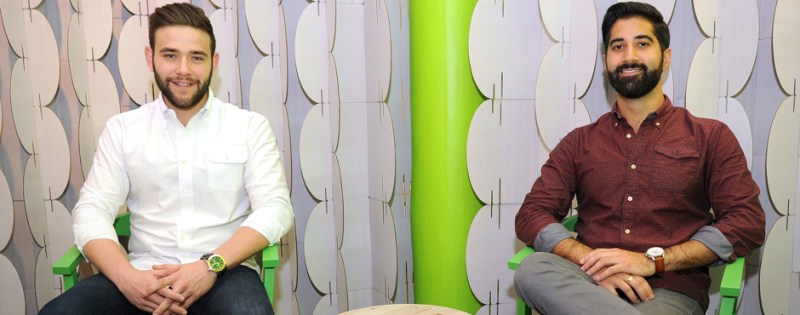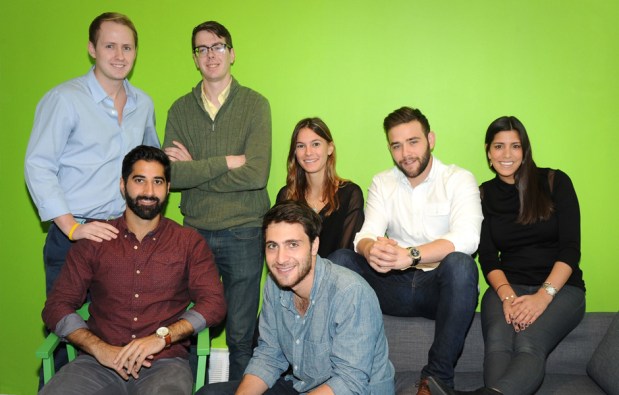
Founded a year ago by David Saad and Natan Fisher, SingleSprout helps build tech teams by hiring top-notch CTOs, engineers, mobile developers, designers, data scientists and project managers in high impact roles. But it’s the time they take to get to know each client’s culture and needs that sets them apart from any ordinary recruiting firm.
“Engineering candidates in New York are in demand and receive cold emails from recruiters daily,” Ilia Papas, Blue Apron Founder and CTO, said. “SingleSprout focuses on building an authentic relationship with candidates and makes sure to prioritize quality over quantity.”
And SingleSprout won’t work with just anyone. They need to believe in the company and its values so they can truly help construct a team that works. “They’ve helped us build an amazing engineering team by deeply understanding our company goals, culture and standards,” Jeff Raider, Harry’s co-founder, said. “They help grow the NYC tech community in a meaningful way by matching really talented people with great companies that enable both sides to achieve their full potential.”
I sat down with David and Natan to learn how the idea for SingleSprout came about, the hurdles they had to face in their first year and how they’re cultivating relationships with companies to build the best tech teams in NYC.
How did the idea for SingleSprout come about? Have you always wanted to work together?
Natan Fisher: We’ve known each other for almost 20 years, dating back to the elementary school playground. We grew up in an affluent community, surrounded by people who always had more, so that fueled us to find success by our own means. We envisioned starting a business together since our early teenage years. With David’s excellent track record in NYC tech recruiting, my sales background and our personable dispositions, we saw a real opportunity for SingleSprout. There’s a lot of drive behind the business because we started it from nothing.
David Saad: Before starting SingleSprout, my father Mauricio was hit by a car and suffered a traumatic brain injury, leaving him paralyzed from the chest down. The doctors said he wouldn’t wake up from his coma, and if he did, he would live for one month. My father opened his eyes one month later, and he fought to recover every day following. Seeing him persist, in spite of his handicapped state, along with my mom’s unconditional determination was extremely motivating and humbling to me – a huge reason why SingleSprout is where it is today. After witnessing that, starting a business and getting it off the ground was nothing to fear. Mauricio’s philosophy was to never give up, up until the very end, and we embrace that every day.
NF: During that time, when David was back and forth to California every month, I held down the fort here while he was on the phone, working as much as he could while supporting his family. It really proved how much valuing relationships matters, both personally and for the business. We truly care about our clients in this same way, and they recognize the difference. We become an extension of their companies.
It seems the tech world in NYC is just starting to grow and develop compared to other places in the United States. Why do you think the industry got a slower start in a city as large and diverse as New York?
DS: The Bay Area is naturally more developed because technology began playing a key role more than 14 years ago. There are many industries specific to NYC such as advertising, fashion, finance, real estate, etc. So now we’re seeing a lot of tech companies pop up that are focused on innovating those businesses, and it’s only continuing to grow.
NF: NYC may have been a later player to the game, but I would say it’s the number two tech city in the country at this time. You look at companies like Google, Spotify and Twitter – they all have offices in NYC for a reason. Founders of startups reach out daily to help with building tech teams. It’s booming here.
Has it been seeing a steady growth with each passing year? Do you see many people moving to NYC from other cities for tech jobs?
DS: The growth has been exponential. When I started recruiting in 2010, engineers would receive an average of 1-2 offers before making a decision. Now it’s in the 3-5 offer range and growing. I’ve seen software engineers from the West Coast move back east for tech jobs. These are people who went to top engineering programs here but moved west several years ago because that’s where all the best jobs were. Now they’re coming back to their families and roots because of the great opportunities here.
You work on building a lot of startups. What are some of the main differences you’ve seen with a small business that’s maybe a year old compared to more established companies that have been around for five years or more?
DS: From a hiring standpoint, it’s much easier to recruit when your company has brand recognition and PR. The struggle with many early stage companies is no one’s heard of them, and they have very little to zero market credibility. They have the hardest time recruiting because they’re competing against companies like Google and Facebook. Every startup should have a strategy to proactively reach out to engineers, otherwise the chances talent will find the startup is slim to none.
NF: On the flip side, there’s something very exciting about startups that are flying under the radar and are less known. Big established brands generally offer less impact and less challenge while early stage startups offer the ability to learn and grow in a fast-paced environment, which many people find more attractive. Your career advances much faster when given the opportunities and responsibilities that come along with building a young business.
Do you ever have individuals who come to you looking for placement or are you mostly approached by companies who need designers and tech talent?
DS: The majority of people who approach us are founders/CTOs/CEOs within companies that need help growing teams. We get multiple requests a week and have to be selective with who we choose to work with. Not every startup is going to make it, nor do we believe in every one, so we have to decide where we should be spending our efforts. In this market, it’s more difficult to engage the talent, so we have a team of recruiters proactively reaching out to the best, who are usually happily employed.
NF: Thankfully, with our relationship-oriented business model, we’ve built a strong and loyal following. We take time getting to know the people and businesses we work with, and this cultivates trust. It’s lead to quite a few talented engineers knocking on our door and asking for guidance. But to no surprise, every company needs engineers, and the demand for talented ones is greater than the supply.
SingleSprout is a company that wants to give back, and you’ve recently been working with companies in the healthcare industry. Could you tell us more about some of the projects you’re focusing on and how they’re helping the local community?
NF: We care a lot about startups that embrace social good. They are 100 percent a priority because we believe it’s important to give back. We’ve partnered with multiple startups that are driving the future of technology in healthcare. They are among the best health-tech startups in NYC, and we’re fortunate to be partnered with them. We’re also working with ScriptEd, an organization that helps underprivileged children learn to code and connect with professionals. We’re very excited about that too.
What’s the greatest lesson(s) you’ve learned in SingleSprout’s first year? How are you going to use that knowledge to grow and develop the business in year two?
NF: David speaks about his father, about his fight and the inspiration he was to us both. I want to point out that David himself was dealing with a roller coaster situation, both at home and with the twists and turns of a startup in its first year. Never did he make excuses. Never did he back down because things were too challenging. In fact, it was the opposite. In the last year, he has put such a positive foot forward and acted fearlessly. He’s garnered respect as one of the best in the industry. Challenges and opportunities will arrive. Approach them fearlessly and don’t make excuses – that’s our mentality on making SingleSprout grow and thrive.
DS: My father couldn’t have made it as far as he did without the support of my family and me. Equally, SingleSprout would not be what it is today without the support and leadership of Natan during our first year. I was traveling once a month to San Diego during our first year while Natan kept growing the business here. It was an excellent showing of trust and teamwork. Looking forward to year two, we’re embracing that same philosophy. Now it’s not only about Natan and David, but the other six people we employ. The way to successfully scale a business is invest ample time in people you believe in so they can replicate your efforts. Year two is all about that and creating an environment where we can rely on each other to build the best tech relationship brand in NYC.
“SingleSprout is helping to build world-class teams for the next generation of New York companies,” Raider said. “Our relationship with them has been incredibly impactful for us, and we hope this is just the beginning.”
To learn more about SingleSprout, visit them at singlesprout.com.
Sources: The Wall Street Journal



